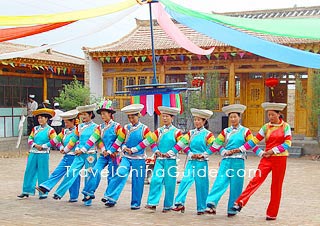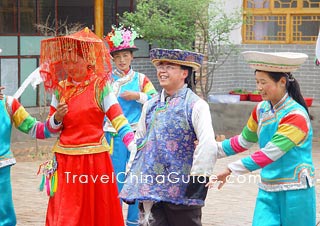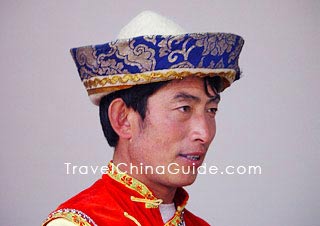Tu Nationality
 |
| Singing and Dancing of Tu Minority, Huzhu County, Qinghai Province |
![]() Language and Character:
Language and Character:
Their spoken language belongs to the Mongolian group of the Altaic Phylum, however, no written form exists. They can write in Chinese and today they are also using the characters created in recent years.
![]() Belief:
Belief:
They practice the faith of Animism and some are the followers of Taoism. After the Ming Dynasty (1368 - 1644), many turned to Lamaism. There are over 40 temples of that religion as the center of Buddhist activities where they live. Dignitaries had also edited many Buddhist sutras and spread widely.
![]() Food and Food Culture:
Food and Food Culture:
 |
| Show of Marriage Ceremony of Tu People |
Their staple food is Qingke, a kind of highland barley, as well as wheat. They are used to eating sour vegetables and meat and drinking milk tea and wine brewed with Qingke. When brewing that wine, they like to add a medicinal herb, thus the wine has a function of dispelling coldness and curing rheumatism. Distinguished and rare guests are treated to delicious boiled mutton to eat by cutting the meat from larger whole pieces.
They pay much attention to etiquettes. They treat guests warmly and there is a saying 'the visit of guests is the coming of happiness'. When the guest sits down on kang, the hosts will offer a strong flavored cup of tea. The Tu people will toast three cups of wine with their guests, which reflects their forthrightness. They will also dip and flip three drops of wine to express their gratitude, if their guests cannot drink.
![]() Clothes:
Clothes:
 |
| A Man of Tu Ethnic Group |
![]() Festivals:
Festivals:
Their grand festivals are Chinese New Year, Dragon Boat Festival, and their own distinctive 'July Meeting'. The July Meeting, also called Nadun Festival, is the carnival after harvest. Activities such as worship, dinners, and attending functions of traditional sports such as wrestling, martial arts and horse-racing are all part of the Carnival after harvest festivities.
![]() Taboos:
Taboos:
They do not present tea with a bowl or cup which has a crack line; they respect their guests and their children must be of best behavior as not to drive guests away; it is not allowed to go into an unmarried girl's room without permission; and so on.![]() More Ethnic Groups in Qinghai and Gansu Area:
More Ethnic Groups in Qinghai and Gansu Area:
Zang (Tibetan) Hui Salar Mongol Kazak Bonan Yugur